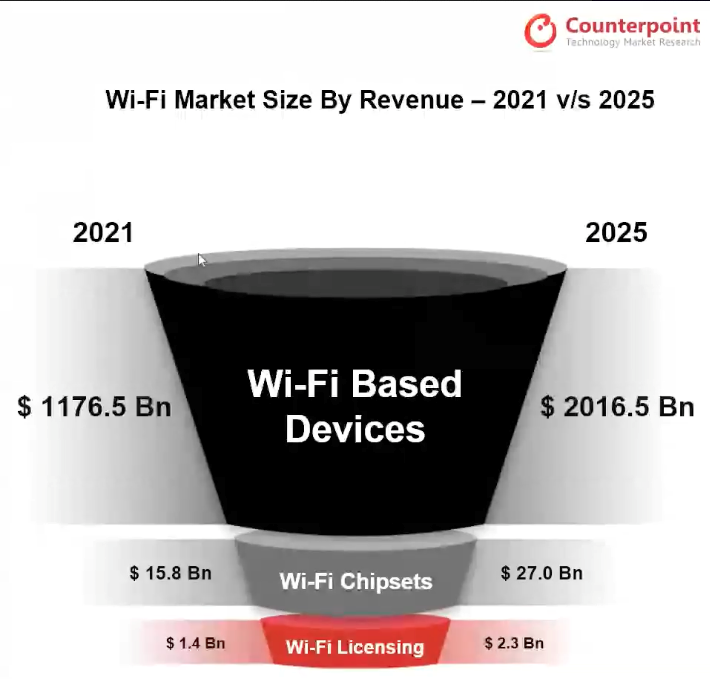Would You Invest $2.3 Billion to Earn $2 Trillion?
Looking at the article title, the numbers have too many zeros for most investors to comfortably apprehend, but assuming that you had $2 billion lying around, would you invest it if you knew it would earn you over $2 trillion? Easy yes for any investor, every single day.
Where are we going with this? In our recent webinar, Neil Shah, partner at Counterpoint Research, reported that in 2021, close to $1.2 trillion of Wi-Fi-based devices were sold, with $1.4 billion in licensing fees paid to the inventors of Wi-Fi technology. In 2025, Counterpoint predicted that over $2 trillion worth of Wi-Fi-based devices will be sold, with $2.3 billion, a bit over 1%, paid to inventors. You can watch the webinar here (https://youtu.be/OmdOAa6SnZs) and Neil’s presentation here (https://youtu.be/OmdOAa6SnZs?t=239).
The Value Proposition of Standards
Most who criticize patent pools or royalties in general focus on royalty payments, not top-line sales of products that royalties enabled, or the business and societal value the technology delivered. Without a robust 5G standard and its predecessors, our smartphones couldn’t interoperate, and the cellphone market would be a fraction of its current size. Without a series of DVB standards, the TV market might be a series of closed silos, with different channels requiring different TV sets. Think of how that might look in your living room or kitchen.
Without a universal Wi-Fi standard, different coffee shops would have different wireless technologies, making connectivity the critical factor when selecting your morning brew. Your workplace or home would need multiple routers to connect to different devices using different wireless technologies. Instead of checking for workout facilities and food services when choosing a hotel, you’d have to ask about supported wireless technologies, and they might be different for your smartphone, tablet, e-reader, and laptop. You get the point.
Looking at the top line question, any investor in their right mind would pay the royalty to enter the market. Clearly, Wi-Fi, smartphone, and TV manufacturers have benefited mightily from the underlying standards. Implementors that step up and pay the royalties support the innovation system that created these technologies and their associated markets. They help fund future technology generations that deliver even more enhanced products and services.
Technology implementors that hold out and refuse to pay these royalties are seeking an advantage against competitors that play by the rules. They hinder the future progress of these standards and actually work against the best interest of their customers.
The next time you hear or read someone criticizing the patent system, patent pools, or royalties in general, think about the Wi-Fi economic funnel from Counterpoint Research. There’s almost certainly a top-line market that more than justifies the payment of royalties for the patented technologies, and a value proposition that any investor would more than willingly pay.

